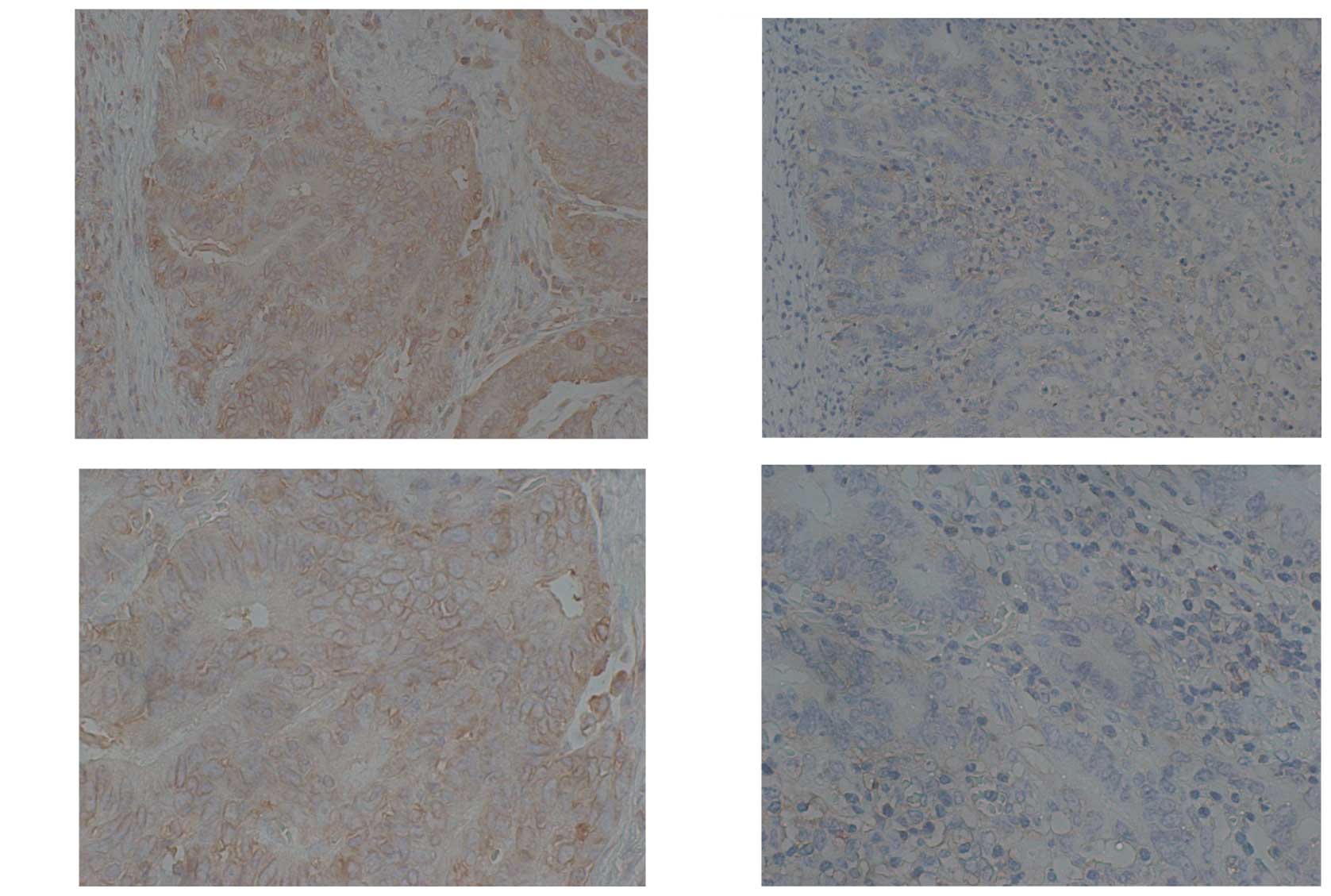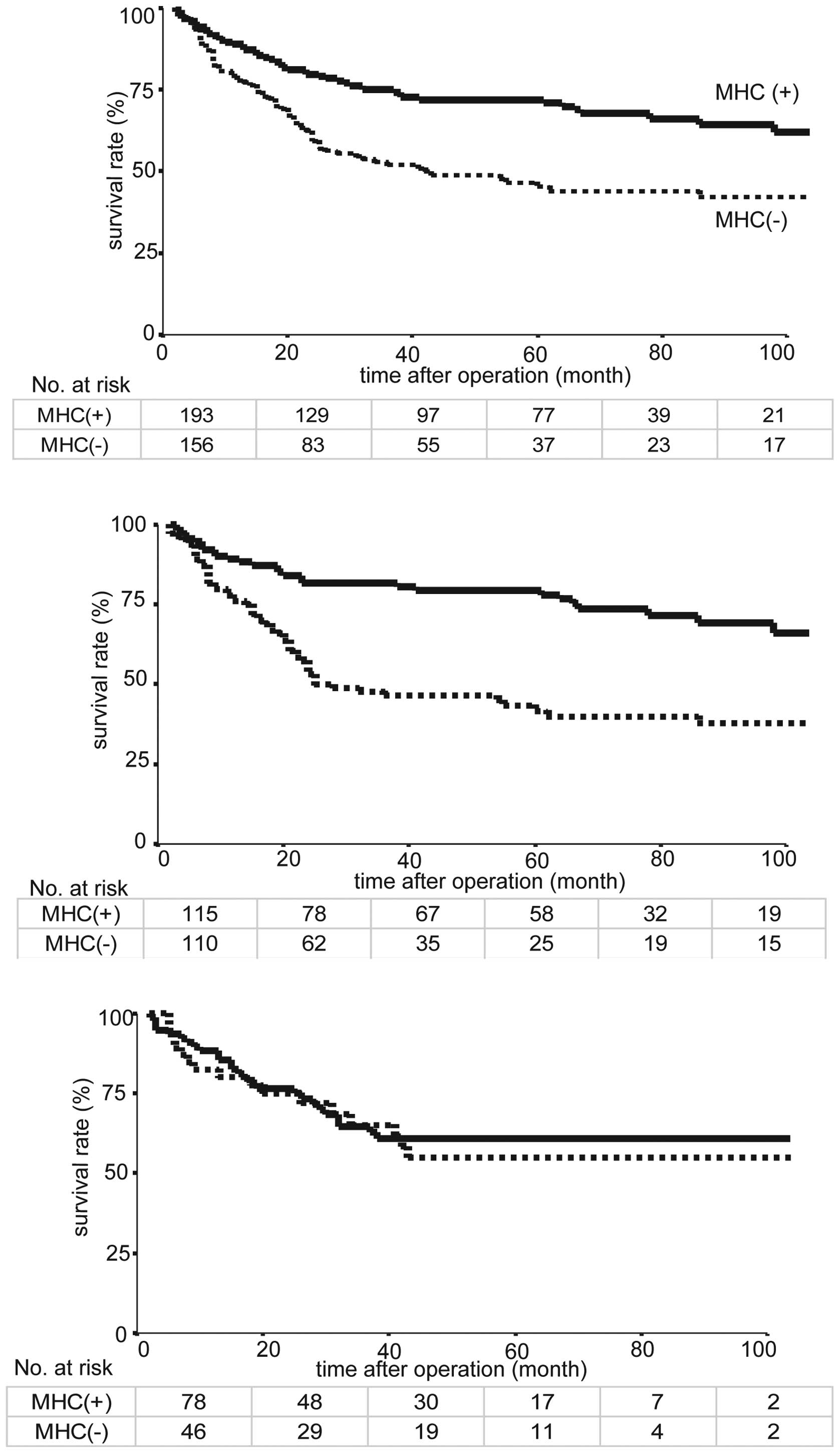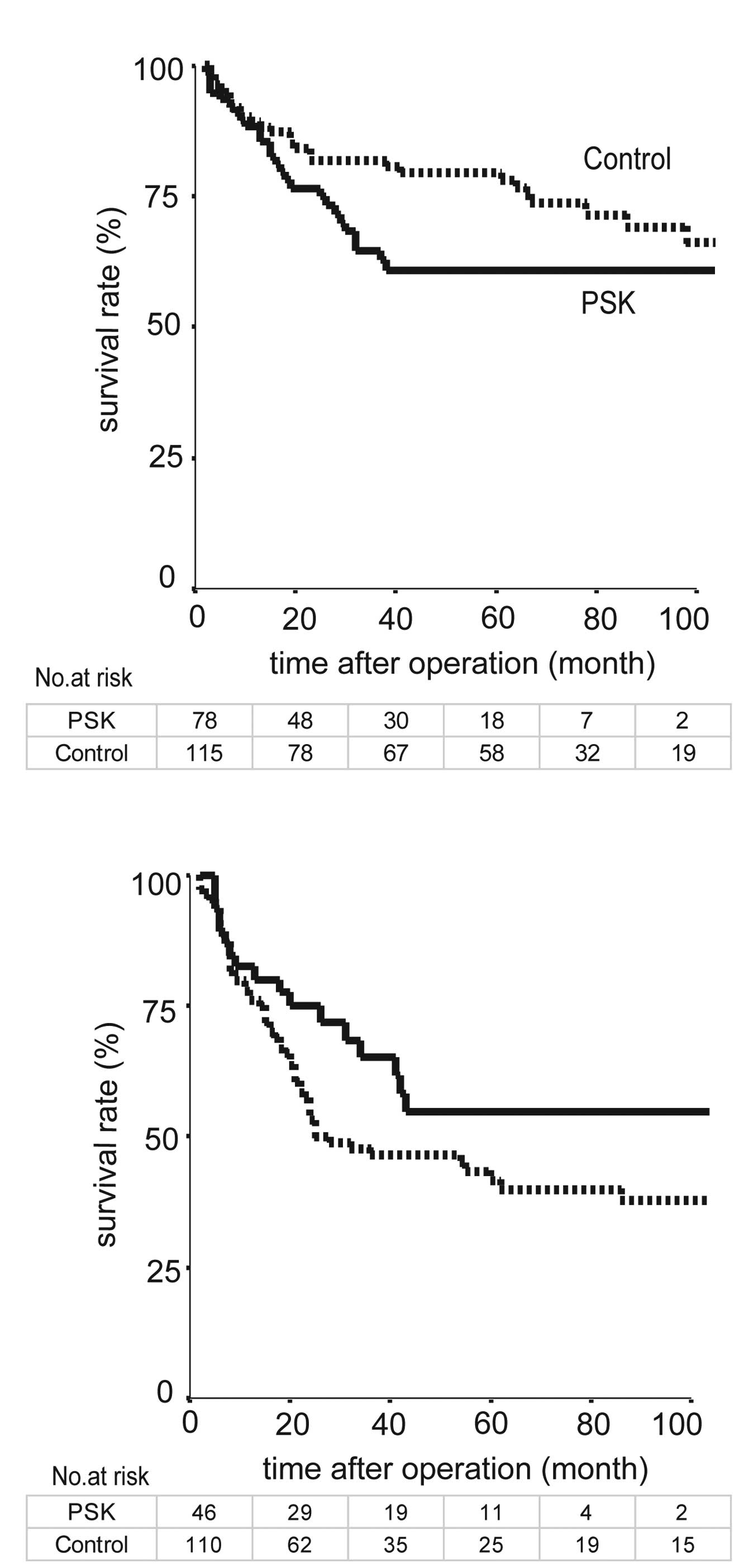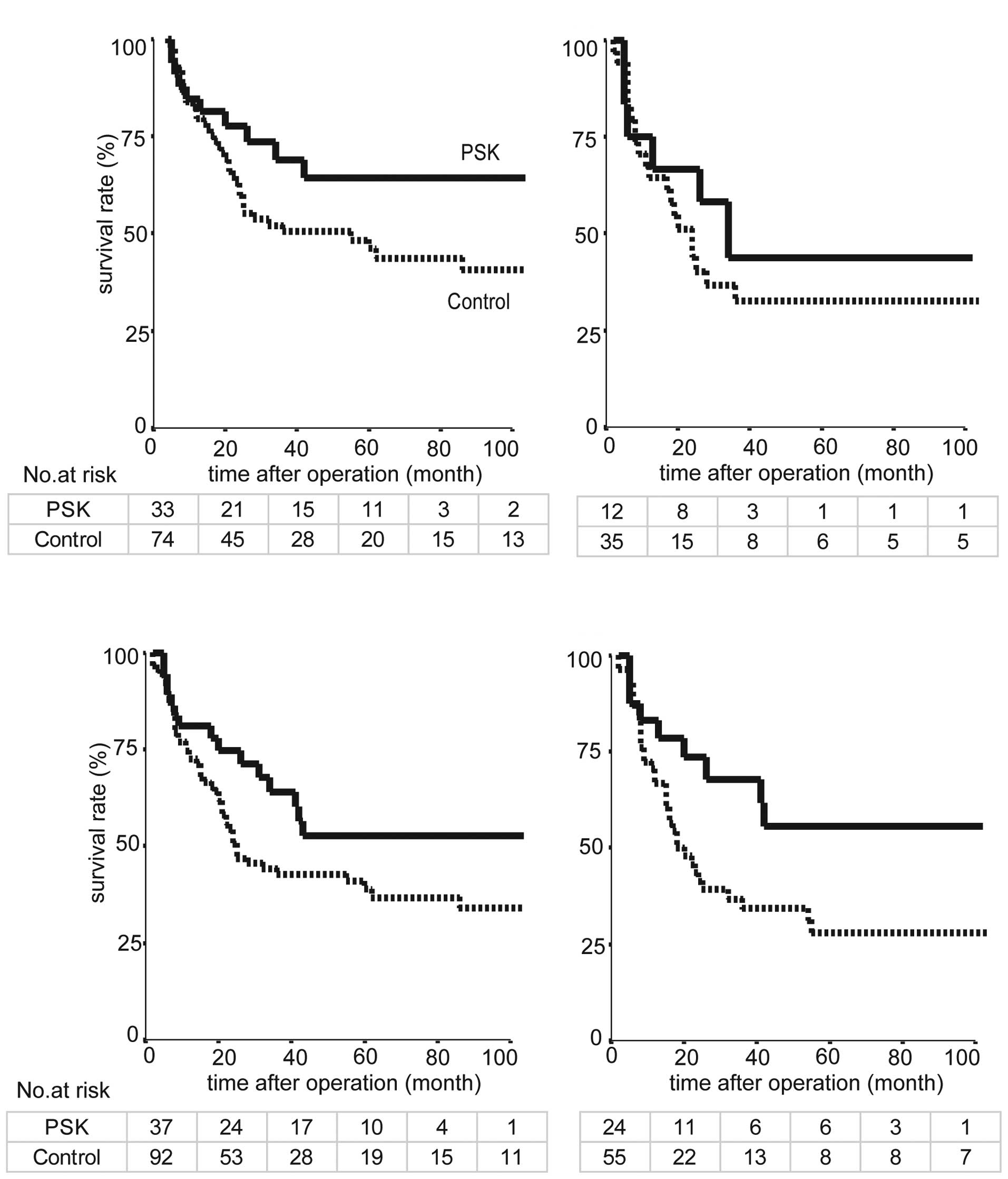|
1.
|
Sakuramoto S, Sasako M, Yamaguchi T, et
al: Adjuvant chemotherapy for gastric cancer with S-1, an oral
fluoropyrimidine. N Engl J Med. 357:1810–1820. 2007. View Article : Google Scholar : PubMed/NCBI
|
|
2.
|
Zhang H, Morisaki T, Matsunaga H, et al:
Protein-bound polysaccharide PSK inhibits tumor invasiveness by
down-regulation of TGF-beta1 and MMPs. Clin Exp Metastasis.
18:343–352. 2000.PubMed/NCBI
|
|
3.
|
Kanazawa M, Yoshihara K, Abe H, et al:
Effects of PSK on T and dendritic cell differentiation in gastric
or colorectal cancer patients. Anticancer Res. 25:443–449.
2005.PubMed/NCBI
|
|
4.
|
Zhang H, Morisaki T, Nakahara C, et al:
PSK-mediated NF-kappaB inhibition augments docetaxel-induced
apoptosis in human pancreatic cancer cells NOR-P1. Oncogene.
22:2088–2096. 2003. View Article : Google Scholar : PubMed/NCBI
|
|
5.
|
Nakazato H, Koike A, Saji S, Ogawa N and
Sakamoto J: Efficacy of immunochemotherapy as adjuvant treatment
after curative resection of gastric cancer. Study group of
immunochemotherapy with PSK for gastric cancer. Lancet.
343:1122–1126. 1994. View Article : Google Scholar : PubMed/NCBI
|
|
6.
|
Cabrera T, Lara E, Romero JM, et al: HLA
class I expression in metastatic melanoma correlates with tumor
development during autologous vaccination. Cancer Immunol
Immunother. 56:709–717. 2007. View Article : Google Scholar
|
|
7.
|
Ishigami S, Natsugoe S, Nakajo A, Arigami
T, Kitazono M, Okumura H, Matsumoto M, Uchikado Y, Setoyama T,
Sasaki K and Aikou T: HLA-class I expression in gastric cancer. J
Surg Oncol. 97:605–608. 2008. View Article : Google Scholar : PubMed/NCBI
|
|
8.
|
Lee HW, Min SK, Ju YS, et al: Prognostic
significance of HLA class I expressing in gastric carcinoma defined
by monoclonal anti-pan HLA class I antibody, EMR8-5. J Gastrointest
Surg. 15:1336–1343. 2011. View Article : Google Scholar : PubMed/NCBI
|
|
9.
|
Liu Q, Hao C, Su P and Shi J:
Down-regulation of HLA class I antigen-processing machinery
components in esophageal squamous cell carcinomas: association with
disease progression. Scand J Gastroenterol. 44:960–969. 2009.
View Article : Google Scholar : PubMed/NCBI
|
|
10.
|
Shimada H, Okazumi S, Koyama M and
Murakami K: Japanese Gastric Cancer Association Task Force for
Research Promotion: Clinical utility of
18F-fluoro-2-deoxyglucose positron emission tomography
in gastric cancer. A systematic review of the literature. Gastric
Cancer. 14:13–21. 2011. View Article : Google Scholar : PubMed/NCBI
|
|
11.
|
Roder JD, Bottcher K, Siewert JR, Busch R,
Hermanek P and Meyer HJ: Prognostic factors in gastric carcinoma.
Results of the German gastric carcinoma study 1992. Cancer.
72:2089–2097. 1993. View Article : Google Scholar : PubMed/NCBI
|
|
12.
|
Sakcak I, Yildiz BD, Avsar FM, et al: Does
N ratio affect survival in D1 and D2 lymph node dissection for
gastric cancer? World J Gastroenterol. 17:4007–4012. 2011.
View Article : Google Scholar : PubMed/NCBI
|
|
13.
|
Kim JS, Kim MA, Oh DY, et al: Increasing
nodal ratio is a poor prognostic factor for survival in stage
III–IV (M0) gastric cancer patients who received curative surgery
followed by adjuvant chemotherapy: a retrospective study. Jpn J
Clin Oncol. 41:245–252. 2011.PubMed/NCBI
|
|
14.
|
Saito H, Fukumoto Y, Osaki T, et al:
Prognostic significance of level and number of lymph node
metastases in patients with gastric cancer. J Surg Oncol.
14:1688–1693. 2007. View Article : Google Scholar : PubMed/NCBI
|
|
15.
|
Funada T, Kochi M, Yamazaki S, Fujii M and
Takayama T: Prognostic significance of a new system for
categorization of the number of lymph node metastases in gastric
cancer. Hepatogastroenterology. 58:642–646. 2011.PubMed/NCBI
|
|
16.
|
Rosenberg SA: Progress in human tumour
immunology and immunotherapy. Nature. 411:380–384. 2001. View Article : Google Scholar : PubMed/NCBI
|
|
17.
|
Mizukami Y, Kono K, Maruyama T, et al:
Downregulation of HLA class I molecules in the tumour is associated
with a poor prognosis in patients with oesophageal squamous cell
carcinoma. Br J Cancer. 99:1462–1467. 2008. View Article : Google Scholar : PubMed/NCBI
|
|
18.
|
Seliger B, Hohne A, Knuth A, et al:
Analysis of the major histocompatibility complex class I antigen
presentation machinery in normal and malignant renal cells:
evidence for deficiencies associated with transformation and
progression. Cancer Res. 56:1756–1760. 1996.
|
|
19.
|
Simpson JA, Al-Attar A, Watson NF,
Scholefield JH, Ilyas M and Durrant LG: Intratumoral T cell
infiltration, MHC class I and STAT1 as biomarkers of good prognosis
in colorectal cancer. Gut. 59:926–933. 2010. View Article : Google Scholar : PubMed/NCBI
|
|
20.
|
Shen YQ, Zhang JQ, Miao FQ, et al:
Relationship between the downregulation of HLA class I antigen and
clinicopathological significance in gastric cancer. World J
Gastroenterol. 11:3628–3631. 2005. View Article : Google Scholar : PubMed/NCBI
|
|
21.
|
Lee TB, Min YD, Lim SC, et al: Fas
(Apo-1/CD95) and Fas ligand interaction between gastric cancer
cells and immune cells. J Gastroenterol Hepatol. 17:32–38. 2002.
View Article : Google Scholar : PubMed/NCBI
|
|
22.
|
Zhou F: Molecular mechanisms of IFN-gamma
to up-regulate MHC class I antigen processing and presentation. Int
Rev Immunol. 28:239–260. 2009. View Article : Google Scholar : PubMed/NCBI
|
|
23.
|
Vanky F, Wang P and Klein E: The
polysaccharide K (PSK) potentiates in vitro activation of the
cytotoxic function in human blood lymphocytes by autologous tumour
cells. Cancer Immunol Immunother. 35:193–198. 1992. View Article : Google Scholar : PubMed/NCBI
|
|
24.
|
Pedrinaci S, Algarra I and Garrido F:
Protein-bound polysaccharide (PSK) induces cytotoxic activity in
the NKL human natural killer cell line. Int J Clin Lab Res.
29:135–140. 1999. View Article : Google Scholar : PubMed/NCBI
|
|
25.
|
Sakai T, Yamashita Y, Maekawa T, Mikami K,
Hoshino S and Shirakusa T: Immunochemotherapy with PSK and
fluoropyrimidines improves long-term prognosis for curatively
resected colorectal cancer. Cancer Biother Radiopharm. 23:461–467.
2008. View Article : Google Scholar : PubMed/NCBI
|


















